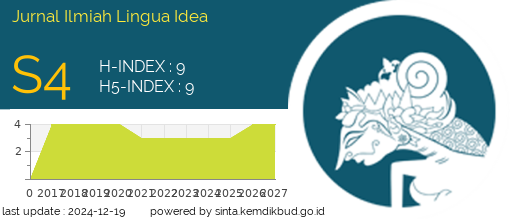prohibiting through command and commanding through prohibition (the study of speech act in javanese culture)
Abstract
This study of speech act discusses a socio-pragmatic phenomena found in Javanese daily communication that, in prohibiting, Javanese people prefer command to prohibition, and in commanding, they prefer prohibition to command. This is due to the fact that in Javanese people’s view, command is the most effective strategy to prohibit someone to do something and prohibition is the most effective strategy to command someone to do something. There are 20 samples of Javanese utterances which are analyzed here. The analysis covers Locution, Illocution, and Perlocution of each sample. However, the effectiveness of those strategies is influenced by two social factors, namely age and social class. Those strategies are effective if they are used by the elder people to the younger ones and by the higher social class to the lower one, but not vice versa.
Authors who publish with Jurnal Ilmiah Lingua Idea agree to the following terms:
- Authors retain copyright and grant the journal right of first publication with the work simultaneously licensed under a Creative Commons Attribution License (CC BY-SA 4.0) that allows others to share the work with an acknowledgment of the work's authorship and initial publication in this journal.
- Authors are able to enter into separate, additional contractual arrangements for the non-exclusive distribution of the journal's published version of the work (e.g., post it to an institutional repository or publish it in a book), with an acknowledgment of its initial publication in this journal.
- Authors are permitted and encouraged to post their work online (e.g., in institutional repositories or on their website) prior to and during the submission process, as it can lead to productive exchanges, as well as earlier and greater citation of published work.





















.png)




_.png)


